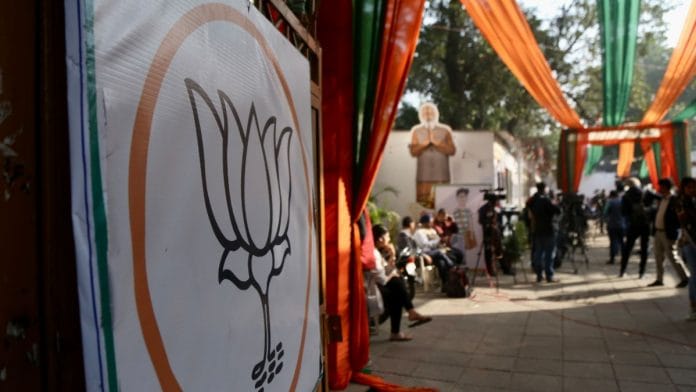New Delhi: With the results of the Delhi civic elections settling in favour of the Aam Aadmi Party (AAP) with 134 seats and the Bharatiya Janata Party (BJP) beating exit poll estimates to cobble up 104 seats, the spotlight is now on who will be the next mayor.
As per rules, the party in majority nominates its candidate as the mayor when the new financial year begins. But if the opposition puts up a candidate to oppose the winning party’s candidate, an election is held. Delhi will now get a single mayor unlike the past when each corporation had their mayors. The BJP was in power in the Municipal Corporation of Delhi (MCD) since 2007.
That the opposition may field a candidate of its own became clear when just hours after the MCD poll results, BJP IT cell chief Amit Malviya tweeted, “Now over to electing a Mayor for Delhi… It will all depend on who can hold the numbers in a close contest, which way the nominated councillors vote etc. Chandigarh has a BJP Mayor, for instance.”
In Chandigarh, despite winning just 12 of 35 wards, the BJP succeeded in getting its mayor elected in January. Even with 14 winning candidates, the AAP failed to get its mayor elected — something which Malviya seems to be referring to in his tweet.
Senior AAP leader Manish Sisodia, meanwhile, claimed that the BJP has started to reached out to his party’s winning candidates.
बीजेपी का खेल शुरू हो गया। हमारे नवनिर्वाचित पार्षदों के पास फ़ोन आने शुरू हो गये।
हमारा कोई पार्षद बिकेगा नहीं। हमने सभी पार्षदों से कह दिया है कि इनका फ़ोन आये या ये मिलने आयें तो इनकी रिकॉर्डिंग कर लें।
— Manish Sisodia (@msisodia) December 7, 2022
For the mayor elections, nominated members do not cast votes, according to a senior MCD official.
The MCD was established in 1958 under the Delhi Municipal Corporation Act, 1957. The civic body was trifurcated in 2012 only to be reunified earlier this year by the Centre.
Also Read: Sole strategist for MCD polls, Santhosh’s stock takes a hit as BJP loses civic body after 15 yrs
Lok Sabha & Rajya Sabha MPs to vote in mayoral election
According to the Delhi Municipal Corporation Act, the MCD is supposed to hold elections every five years, to decide which party will stay in power. Section 35 of the act mandates that the MCD must elect a mayor every financial year at its first meeting of that year.
While the mayor’s tenure lasts one year, the act mandates that in the first year of a party’s tenure, it must elect a woman for the post of mayor, and a member of a Scheduled Caste from its councillors for the third year.
Since this year, the MCD elections were held in December instead of April, only four months of the mayor’s term are left. It is still not clear whether elections will be held sooner or later.
Apart from the elected councillors, 10 Lok Sabha and Rajya Sabha MPs from Delhi and 14 MLAs are eligible to vote in the election.
According to a BJP leader, it is the Assembly Speaker’s discretion whom to call from the MLAs to vote this time round. “The Speaker has to ensure that every MLA should get an opportunity to vote in a span of five years,” said a BJP leader, explaining the rationale for 14 MLAs.
Since the Speaker is from the AAP, it’s not difficult to guess which party will be invited in the first year of the mayoral election.
“Apart from the councillors, 7 Lok Sabha MPs and 3 Rajya Sabha MPs are also eligible to vote. Nominated members don’t vote for the mayor’s election,” former leader of the House in MCD and BJP’s Subhash Arya said, explaining the procedure to elect a mayor.
While all the 7 Lok Sabha MPs are from the BJP, the AAP has three Rajya Sabha MPs. With the 7 MPs, the number of BJP voters in the mayoral election will go up to 111 (including 104 councillors) while the AAP’s strength may go up to 151, including 134 councillors, 3 RS MPs and 14 MLAs (subject to the Speaker’s decision). The councillors along with Delhi MLAs and MPs make up the 274-member electoral college in the Mayoral election.
The BJP may still hope to turn the table on the AAP, given that anti-defection law is not applicable in the municipal polls.
Elections will take place if the BJP and the Congress oppose the AAP candidate and field their own nominees. In such a scenario, the candidate with the most votes will become the mayor.
If there’s a tie between the contestants, the special commissioner appointed to oversee the election will allow the tie to be broken by a special draw of lots. The candidate whose name is drawn receives an extra tie-breaking vote. Since the anti-defection law doesn’t apply to mayoral elections, the chances of cross-voting can’t be ruled out.
This was the first election after the MCD was reunified earlier this year. In 2017, the BJP clinched 181 of the then 270 municipal wards while AAP had won only 48 and the Congress finished third with 30.
(Edited by Tony Rai )
Also Read: ‘She’ll think for everyone’ — flowers & hope as Bobby Kinnar becomes Delhi’s 1st trans councillor






